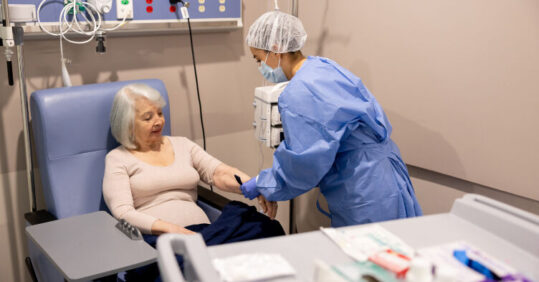Lockdown negatively impacted rare cancer outcomes

Cancer patients in Scotland were less likely to receive curative treatment in the post-lockdown period leading to negative impacts on rare cancer outcomes, according to new research.
A study from the University of Dundee found that Scottish patients diagnosed with oesophageal cancer, one of the least survival cancers, were 13% less likely to receive treatment to aid recovery and more likely to be offered palliative care.
The researchers found that on average post-lockdown rare cancer patients survived three months less than patients diagnosed and treated immediately before lockdown.
Related Article: Measures to prevent cancer would be cost-effective, suggests economic report
The study is published in the British Journal of Surgery and is one of the first to look at the impact of the Covid-19 pandemic on cancer survival rates.
More than 9,000 new cases of oesophageal cancer are recorded in the UK each year, with 1 in 50 males and 1 in 96 females diagnosed with the disease in their lifetime. Around 60% of people die within a year of being diagnosed with oesophageal cancer.
Researchers examined the care of 958 patients across Scotland diagnosed with oesophageal cancer within the NHS. They analysed the clinical pathways for diagnosis, treatment and outcomes in the six months immediately before and after lockdown.
On average, patients who presented as part of the post-lockdown cohort were in a poorer state of health, and the cancer was more advanced, meaning that treatment options were limited or just palliative care was available. According to the researchers, this is very ‘significant’ for a less survivable cancer.
Overall there was a poorer survival rate overall for the post-lockdown cohort, with patients surviving on average three months less than those in a similar position who joined the clinical pathway before lockdown.
Professor Russell Petty, from the University of Dundee, said: ‘In many respects the pandemic allowed us to undertake an investigation we would never have wanted to do, namely asking what the impact of delaying cancer presentation is.’
Related Article: Mythbuster: ‘I don’t need a smear test – I’ve had my HPV jab’
The researchers found no issues related to the clinical pathway once a patient was referred post-lockdown. Professor Petty suggests that the delays came in the initial presentation at patients’ GPs, but this was not specifically investigated and is the subject of ongoing research.
He said: ‘Our work starts to explain that delayed presentation of cancer patients to GPs as a key issue. This is topical given the current primary healthcare issues and cancer waiting times.’
Recent reports have suggested that the absolute number of cancer deaths decreased in 2022 and have indicated that the impact of the pandemic on cancer was less than previously thought. Professor Petty believes this is ‘a misrepresentation’, and it is too early to know the impact of the pandemic on survival in 2022 for many cancer types.
He added: ‘Our work shows that with the less survivable cancer types like oesophageal and gastric cancer, where the impact would be expected to be seen quicker due to the natural course of the disease, then they are acting as an early warning signal. A true picture of how the pandemic impacted more survivable cancer types will not be formed for some years.’
Related Article: Smoking rates fall most significantly in the North of England

See how our symptom tool can help you make better sense of patient presentations
Click here to search a symptom




